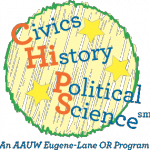 Advancing Positive Outcomes
Advancing Positive Outcomes
CHiPS’ strategies are grounded in academic findings, including …
- This 2011 study, “Civic Education and Knowledge of Government and Politics,” from Georgetown University and the Center for Civic Education
- This 2006 Oregon Civics Survey sponsored by the Classroom Law Project
- This 2011 report, “Guardian of Democracy: The Civic Mission of Schools,” © The Leonore Annenberg Institute for Civics of the Annenberg Public Policy Center at the University of Pennsylvania and the Campaign for the Civic Mission of Schools.
The Challenges
- There’s a nationwide political knowledge gap. A 2011 Pew Research Center study found the political knowledge of Americans has remained at virtually the same low level for more than 50 years. [Source]
- Students are underperforming in CHiPS curriculum. In 2014, The Nation’s Report Card reported that, for the eighth grade level, only 23% of students were proficient in Civics; even fewer (18%) were proficient in History. [Source]
- Many young people aren’t engaged in civics. The 2006 Oregon Civics Survey found that participating high school students showed “limited commitment or capacity to become politically involved” and were “uncertain as to whether they knew enough to follow discussions about current issues: Iraq, the economy, taxes, education, health care, etc.” [Source]
- Women are underrepresented in civics. In a 2014, the Women Donors Network (WDN) found that more than three-quarters of political candidates nationwide were men. [Source] WDN’s 2015 analysis found that only about 1 in 5 of the 2,400 elected state and local prosecuting attorneys nationwide were women. [Source]
The 2006 Oregon Civics Survey concluded: “In short, many of today’s young people lack the basic knowledge and skills to effectively participate as citizens, and they often lack the dispositions to do so.” The underwhelming numbers of women in politics and law underscores that this concern is particularly significant for young girls.
The Possibilities:
Fortunately research also shows us promising possibilities we can build on. The 2006 Oregon Civics Survey, the 2011 “Civic Education and Knowledge of Government and Politics study, and other similar resources suggest that the most promise is found by combining classroom, community and home-based activities:
- Classroom instruction in government, history, law and democracy and citizenship
- Classroom simulations of the democratic process
- Classroom current event conversations, discussed in an analytical and personally relevant way with exposure to diverse perspectives
- Student governance opportunities as school leaders and as mock legislature representatives passing student-prepared bills
- Community service and extracurricular activities connected with civics curriculum (clubs, student council, debate, school newspaper, volunteer outreach, etc.)
- Hands-on classroom experience in proposing solutions and addressing real-life civic issues; speaking at community meetings, writing letters, recruiting others to get involved, etc.
- Interaction with elected officials and other community role models
- For girls in particular, discussing government, civics and community issues with their parents
CHiPS is dedicated to advancing these and other initiatives for students in general and young girls in particular, providing a clear path toward embracing successful roles as public service leaders.
Next Steps:
- Visit our CHiPS Resources Library
- Check out our brochure
- Contact us with your questions and comments
